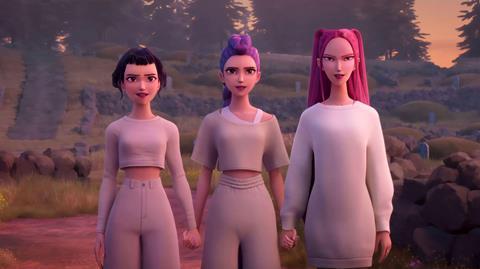Writer Amy Clarke dives into the unexpected cultural phenomenon of K-pop Demon Hunters, a film that fuses dazzling pop spectacle with surprisingly weighty themes. With both a fan’s enthusiasm and a Christian’s thoughtful lens, she unpacks how this animated adventure balances soul-thrilling fun with deeper reflections on shame, forgiveness, and identity.

A movie called K-pop Demon Hunters taking the world by storm was not on my 2025 bingo card. I only found out it existed about three weeks before it was released – when a wacky trailer promised me an unashamed animated escapade in the world of K-pop. I sat down to watch it the day it dropped. And then I watched it again… and again. And suddenly it seemed half the world was doing the same.
I was already a diehard K-pop fan; a bullseye in the metaphorical target audience, but there was a catch. As a Christian, a movie about ‘demon hunters’ could rub up uncomfortably against my faith. I approached it hopefully but cautiously.
READ MORE: Does the rise of Korean culture in the global stage direct us to a move of God?
Let’s get the basics out of the way upfront: the demons in this movie are not biblical demons.
Let’s get the basics out of the way upfront: the demons in this movie are not biblical demons. They are monsters based on Korean mythology. They will be scary to kids, but from a faith perspective they are just like other made-up movie bad guys. The demons want to eat human souls, but the titular Hunters fight them off in style using power from music, which connects fans and lights up souls, to build a demon proof barrier around the world. All goes smoothly until the demons decide to disguise themselves as a swoon-worthy boyband to steal the fans!
The movie treats this concept with disarming sincerity, and hilarious accuracy to K-pop fan culture.
The movie treats this concept with disarming sincerity, and hilarious accuracy to K-pop fan culture. The animation and music are delightful, but the heart of the story is revealed when we find out (spoilers!) that the Hunters’ lead singer, Rumi, is hiding that she’s half demon. She’s desperate to cover up her identifying patterns until she can erase them. Then there’s Jinu, human-turned-demon leader of the demon boyband. He’s tortured by the memories of when he abandoned his family and only wants to defeat the Hunters so those memories will be erased.
READ MORE: Women in South Korea are faced with having a job or having children
Throughout the movie, Rumi and Jinu struggle with their shame. Rumi strives for perfection, believing it will fix her, but her voice gets injured by the strain. Jinu believes that he doesn’t deserve to be better and doesn’t try, but his conscience pains him endlessly. Now this movie was not written with a biblical metaphor in mind, but it’s hard not to see reflected how we humans often try to deal with our own sin and shame. It is easy to fall into chasing perfection we cannot reach, believing we can fix it all. Also easy is defining ourselves by our sin, painfully justifying never changing. The methods may seem different, but they are two sides of the same coin and ultimately lead back to the same brokenness.
As the bands compete Rumi and Jinu clash on several occasions but realise they are uncomfortably similar. Rumi’s growing internal conflict and secrecy confuses and hurts her bandmates. She and Jinu come up with a plan to free themselves, but at the last moment Jinu, afraid he can never be free, betrays her by revealing her secret to the world. Rumi’s bandmates are horrified to see her as a demon and crushed that she lied.
READ MORE: Does the rise of Korean culture in the global stage direct us to a move of God?
The movie has been hinting all along at the true way Rumi and Jinu can heal. As the demons, lead by broken-hearted Jinu, hold a final concert to take all the fans’ souls, Rumi finally faces her brokenness with honesty. Her sung confession allows her to be truly connected with her bandmates, their forgiveness and love drives out shame and empowers them to fight again. Jinu finally sees that he can choose to be better, and frees himself from the demons by taking a blast to protect Rumi. The conclusion is beautiful and bittersweet; Rumi scarred but accepted, Jinu gone but as a free man. Even outside of the Christian worldview, human hearts recognise the power of forgiveness and honesty to free us. And with Jesus, we know we can be healed without even a scar.
K-pop Demon Hunters, much like its protagonists, is not a perfect movie. It works best if you don’t take it too seriously. Yes, it handles some big themes, but it’s equally about the music, the sisterhood, the laughs, the epic fights and the handsome rivals. Enjoy it at the peril of your Spotify wrapped.


































1 Reader's comment